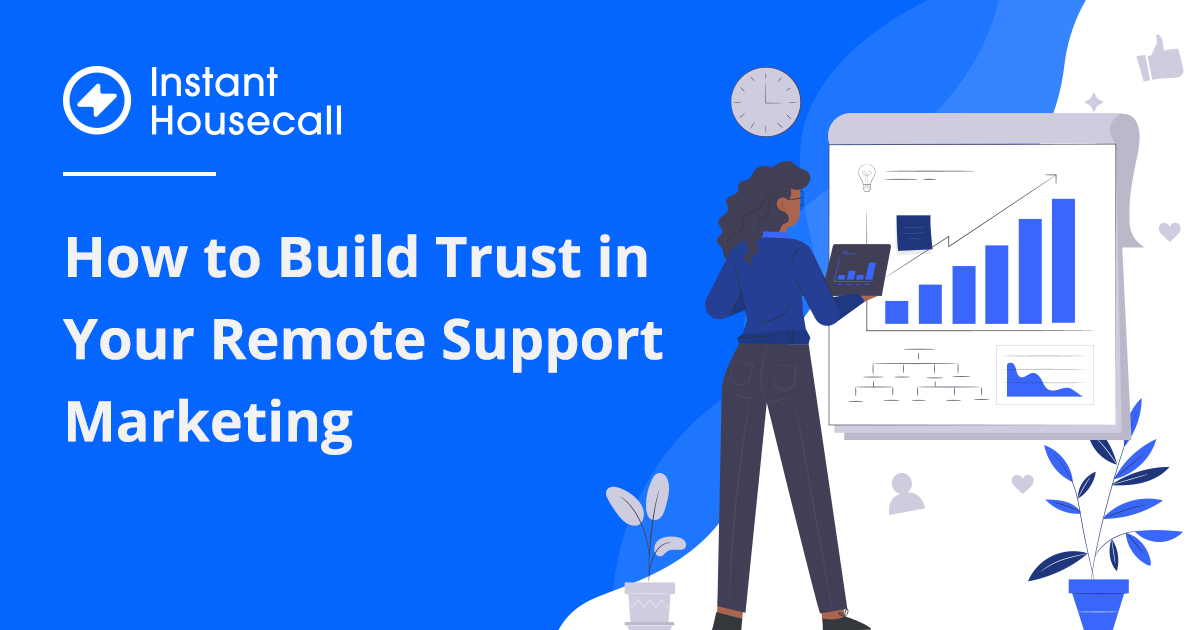One thing that can hold people back from using remote support services is that they’re afraid of having someone open a connection to their PC.
They may think, “Is this opening a ‘back door’ that can be used later for stealing my information?” Or… “Are they going to be able to see all my browsing history and personal photos?”
In the case of a business client, they may wonder the same types of things about data security and whether opening a remote portal will somehow leave them at risk, even if it’s not from you, but from a hacker that later finds that portal.
Remote support is only going to grow as a portion of an MSP and IT business owner’s revenue. According to a survey by Gartner, 80% of company leaders plan to allow employees to work remotely at least part-time post-pandemic, and 47% of them plan to enable full-time work-from-home employees.
Tips for Marketing the Safety & Security of Your Remote Support
Marketing your remote support services successfully should include addressing how to let customers know remote support is safe. Getting past this major barrier can keep you from losing potential business and help your company take advantage of the remote working trend.
Highlight the One-Time Connection
You can help alleviate fears that unscrupulous hackers will find your connection “portal” and use it to continue connecting to a PC after the support call by noting how one-time connections work.
When marketing remote support for one-time support calls (not ongoing MSP monitoring) emphasize the “one-and-done” nature of your support software.
When people know that you can only connect one time, unless they give you permission otherwise, it alleviates fears of an ongoing IT security weakness that might cause a breach later.
Use easy-to-understand terms, such as the Time Window. Explain that customers can open up a time window of their choosing for up to 12 hours and that the “portal” closes and can’t be reopened beyond that window.
Address the Remote Support Scam Element
A customer might not come out and say it, but in the back of their mind, they may be wondering about all those “Microsoft support” scams they’ve heard about online. This can cause them to be tentative about contacting you for remote support.
Address the elephant in the room and get it out of the way by including a note on your remote support page that speaks to the differences between your service and those unscrupulous support scams.
Here are some ideas:
- We never call you unsolicited and ask to connect (unlike those scams).
- You can see us in person at our shop, so you know who is assisting you virtually.
- We’ve been a trusted (name of city) fixture for x years (we’re not a stranger).
Promote the Security In Common Terms
It’s important to not just say that you use 256-bit SSL encryption but to explain what that means beyond the “techie term” that a layperson may not know.
For example, you might say, “Our remote support connections use 256-bit SSL encryption, which is one of the most secure encryption methods used worldwide. Hackers would need to guess 256 separate bits of information to try to crack the encryption. According to experts, that would take millions of years to hack.”
Now, you’ve translated the encryption standard into common terms that everyone can understand. Their takeaway is that your remote support can’t be hacked unless a hacker has a few million years to try.
Include Social Proof
No matter what you’re selling, social proof is important. This means having testimonials and quotes from other customers.
78% of people trust online reviews as much as they do a personal recommendation from friends or family. So, adding a quote from a few other customers about how great your remote support is, can make someone else feel better about using it (e.g., “If that accounting firm is okay using their remote support, then I guess it really is secure.”)
Mention Multi-Factor Authentication (MFA)
Another security protocol you want to highlight is multi-factor authentication. If you’re using a tool like Instant Housecall with MFA support, it goes a long way towards alleviating any security concerns about a hacker being able to somehow exploit the remote connection.
Go beyond just saying you use MFA and explain what that means:
“Technicians need to enter a code that is sent only to our company cell numbers before they can log in. This keeps hackers from accessing remote support connections because they don’t have access to the MFA code.”
Use a Remote Support Software With Rock-Solid Security
Instant Housecall remote support software incorporates multiple security standards you can market to your customers, including a time window, 256-bit encryption, and MFA.
Try Instant Housecall risk-free for 15 days and experience it for yourself!



0 Comments